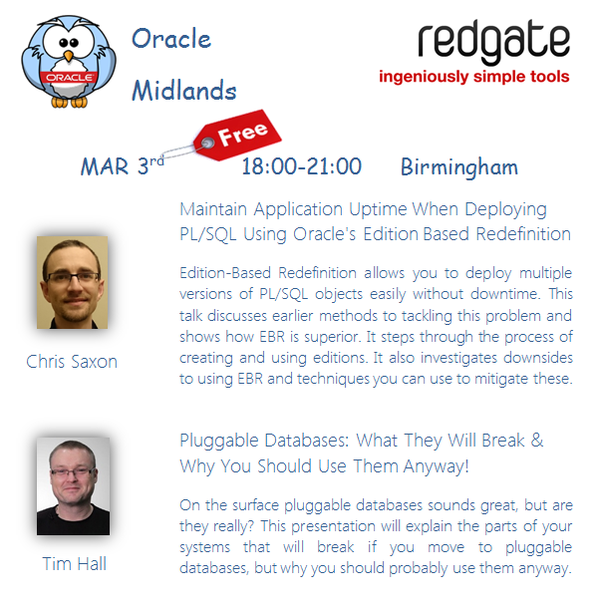The event was held at a cinema in a shopping mall. We even got a free popcorn ticket. Awesome! I missed the starting keynote, which was a pity because everyone said it was really cool. So my day went as follows.
Krasimir Tsonev : Using Node.js for everything or what it is to write a book about it
I went to this session because I wanted to be with the “cool kids”. 🙂 I ended up chatting to Kasimir during lunch and in the evening. He’s from Bulgaria, so I was able to use my extensive Bulgarian vocabulary on him. 🙂 I’m never going to be one of the cool kids, but it’s good to get some context about different technologies. What is it? What does it do? What is it good at? What is it bad at? Where should I avoid it? It was good to get a feel for this from someone who is really using it, not just writing about it like it’s the Emperors new clothes.
Heli “Hell-Squirrel” Helskyaho : 9 use cases for Oracle SQL Developer Data Modeller
Back in the day we used to spend a lot of time on database design. I remember spending hours in Oracle Designer. Nowadays database design seems to have fallen by the wayside, which is a pity because good design is important if you want good performance and you want your application to stand the test of time. Adding in new functionality on top of a badly designed database is a nightmare. Extending a good design is usually much simpler.
In this session my daughter gave an overview of Oracle SQL Developer Data Modeller. For those familiar with Oracle Designer, there is enough similarity to give you a warm and fuzzy feeling. The session included 9 ways to use the tool, including importing from previous tools like Erwin and Oracle Developer.
Me : PL/SQL : Stop making the same performance mistakes
Next up was my PL/SQL performance session. I had some problems with the screen at the start, so I was just about to launch into a no-slides, no-demos version of the talk, then they realised my adapter was faulty and everything was working again. My bad! The talk went well and I managed to finish on time. A number of people had questions, which took me through the break and right up to the next session. Happy days. 🙂
Roel Hartman : The best of both worlds : Going hybrid with your mobile APEX Oracle Application
This session showed how to use Apache Cordova to create an APEX application that acts like a native app, allowing it to interact with information from the phone, such as contacts or compass etc. It’s a really neat solution to allow you to bridge the gap between mobile web apps and native apps, allowing you to stick with your preferred development tool, in this case APEX… I feel like a native developer now. 🙂
Robin Moffatt : No Silver Bullets – OBIEE Performance in the Real World
I’m not an OBIEE guy, but I wanted to see Robin present and I loved it. If Cary Millsap did a presentation on OBIEE performance, it would be pretty much like this session. Robin referenced Cary’s “Thinking Clearly About Performance” paper at the start of the session and that really set the scene. He’s a confident, no-nonsense presenter, which I really like. Well worth going to watch, even if OBIEE is not your thing, because the approach he speaks about it pretty much universal for identifying and fixing the actual problem, rather than relying on Voodoo.
Me : A Oracle DBA’s guide to WebLogic server
I was then up again for the last session of the track. This time it was my introductory WebLogic session. It really was the end of the day and I think everyone, including me felt like it. 🙂
The Evening
After the last session, we took a taxi back to the hotel to drop off our stuff, then headed out to the closing party at a bar in the old town. I had a couple of pints and watched the band, which I believe was made up of some of the techies from one of the local companies. I really enjoyed it! After the band came some comedians, which I didn’t really hear as I was standing at the other side of the room talking geek with Robin Moffatt. When the festivities were over we headed back to the hotel and sat in the bar chatting for a couple of hours, then it was off to bed.
It was a long day, but a really enjoyable one. The conference was great fun and all the people I interacted with were really enthusiastic! I’ll write some more about the event in my closing post.
Cheers
Tim…
